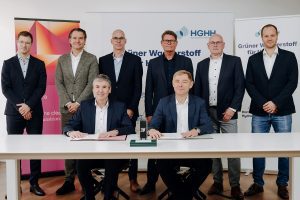According to Unitrove, the facility will be vital in providing zero-emission fuel for the international shipping industry.
Steven Lua, CEO of Unitrove, said his ambition was to enable clean, affordable, reliable, and sustainable fuelling options for ships at every port in the world – and he believes liquid hydrogen will play a vital role, especially for larger sea vessels.
“The global maritime sector is one of the most polluting in the world. It’s estimated that just a handful of the worst-polluting mega ships on our oceans today produce more pollution than all the world’s cars put together,” said Mr Lua. “That’s a staggering statistic, and one we simply cannot ignore.
“To achieve net zero by 2050 needs the combined will of the industry and governments. As well as building new vessels, we need to ensure the infrastructure is in place. At this moment in time, there’s no clean-fuel bunkering infrastructure – it’s practically non-existent.
“Without zero-emission fuelling infrastructure, the drive for zero-emission ships will falter. In terms of infrastructure, there’s nothing significant in place today, but we are here to change that.
“The average lifespan of a large ship is anywhere between 20 to 40 years, meaning any ship procured today could potentially still be operating well beyond 2050.”
Mr. Lua said liquid hydrogen as a commercial fuel was relatively unexplored as an option – but that it had great potential for many uses, including plugging the gap where electric and compressed hydrogen cannot reach.
“We already see very early signs of light-duty vessels being battery-driven or powered by compressed gaseous hydrogen, but liquid hydrogen will allow us to serve the heavier portion of the shipping fleet where we hope to have a much larger impact.
“We are also exploring options including ammonia, liquid organic hydrogen carriers, and solid hydrogen in the form of sodium borohydride. However, we understand that priority is currently being given to the development of international standards and regulations for pure hydrogen, and this could play a significant factor in the long run.
“We believe that hydrogen will be recognised as a global commodity that will be traded in the same way that natural gas is today. The bunker fuel market is worth an estimated USD 120 billion, so there is a huge opportunity not only in environmental and social terms, but also financially.”






